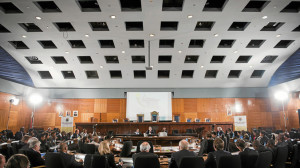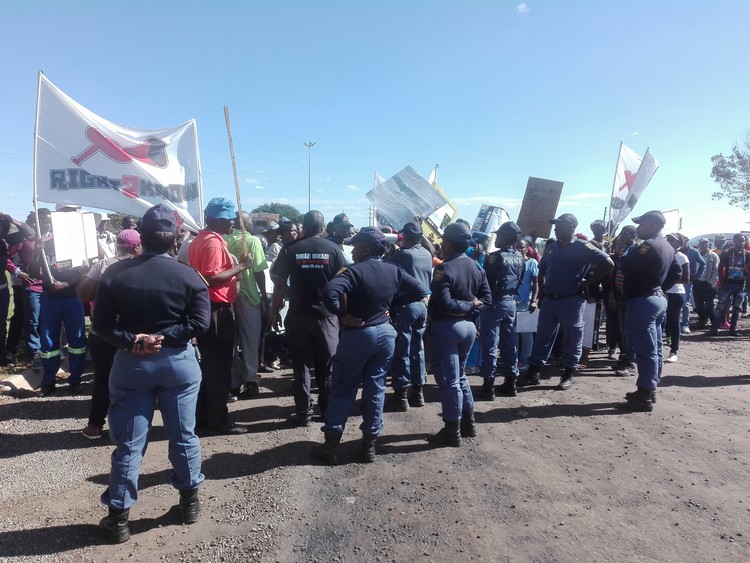The arms deal: Does anybody still care?
This article below was published online by Mail&Guardian:
The arms deal commission’s phase two witness list is out. But is there any public interest left?
By Sarah Evans
NEWS ANALYSIS
Even the most apathetic South African could rattle off a couple of coherent sentences on the arms deal masquerading as the War on Terror when pressed to do so over dinner.
And anyone with half an eye on world developments could add something intelligible about the arming and disarming of Muammar Gaddafi, and the merciless war in Libya.
It seems trite to say these arms deals were highly publicised, for they were the bi-products of war.
And so the dinner table might speculate that arms deals are messy, highly corrupted transactions.
Yet the arms bazaar that came to South Africa in the early 1990s, when the post-1994 hangover was still but a pair of blood-shot eyes and a whiff of gin on our breaths, has long since slipped from our national conscience.
Of course, the measure of national conscience can hardly be an apathetic citizen’s dinner table chatter. But it is true that the 2014 election campaigns were utterly devoid of any reference to the R70-billion deal, or the approximately R1-billion in bribes that allegedly changed hands to make it happen.
And phase one of the arms procurement commission (APC), seated at the Tswane council chambers, was characterised by empty public benches.
The Sammy Marks building in Pretoria, a bustling shopping centre and public access to the hearings, is perhaps the very point of the hearings’ existence.
Yet day after day, the commission’s chairperson, Judge Willie Seriti, looks down from his bench over the top of his glasses at rows of empty seats in the public gallery.
Beneath him are the legal teams, evidence leaders, defence teams and witnesses. There are two rows of media, to Seriti’s left and right. Beyond is a smattering of South African National Defence Force (SANDF) representatives, and one or two arms company representatives studiously take notes.
And then there are the empty rows.
Moves are afoot to mobilise for more active citizen participation in phase two of the arms procurement commission, which starts on July 21. This phase will deal with the allegations of fraud and corruption that stem from the deal, which is surely the central question that arises from the entire saga
This week, the list of phase two witnesses were released. They are, in order of appearance:
- Richard Young – losing arms deal bidder-turned-arms deal activist;
- Patricia de Lille – former Pan Africanist Congress MP, now City of Cape Town mayor. First blew the whistle on the arms deal by presenting an explosive dossier in 1999 David Maynier – Democratic Alliance (DA) MP
- Gavin Woods – former member of the Inkatha Freedom Party and former chairperson of the standing committee on public accounts (Scopa), who resigned as a result of the political fallout from the arms deal investigation
- Raenette Taljaard – former DA MP and member of Scopa, and author of Up in Arms
- Andrew Feinstein – former ANC member of Scopa, author of several books on South Africa’s arms deal and arms deals abroad, including After the Party and The Shadow World
- Paul Holden – researcher and co-author of The Devil in the Detail: How the Arms Deal Changed Everything
- Hennie van Vuuren – researcher and co-author of The Devil in the Detail: How the Arms Deal Changed Everything
- Terry Crawford-Browne – former banker who successfully took government to court, compelling it to establish an independent commission of inquiry into the arms deal
- Shamin “Chippy” Shaik – former head of acquisitions for the SANDF
- Fana Hlongwane – former adviser to then-defence minister, Joe Modise
- Colonel Johan Du Plooy – former Hawks investigator, investigating the last two legs of the arms deal, which involved the British and German arms companies
- General Hans Meiring – former head of the commercial crimes unit within the Hawks, who wrote a memo to the head of the hawks, Anwar Dramat, in September 2010, motivating for the last two legs of investigations to be closed. Dramat closed the investigations a week later.
The witness list contains those who have reported on allegations of corruption, and two who have been accused of it – Shaik and Hlongwane. There are myriad others who should arguably have been included, centrally the arms companies themselves – the alleged bribe-payers.
Even so, the list is surely controversial enough to spark some level of interest.
But the allegations are highly technical and involve offshore accounts, shareholdings and secondary contracts: not exactly terminology that provides easy pay-off lines and hashtags.
The allegations are also 15 years old: before the commission’s dull demeanour could even begin to be criticised, the allegations were stale. The dearth of public interest in the arms deal could stem from cynicism, said Mail & Guardian deputy editor, Moshoeshoe Monare on Tuesday.
“Perhaps we [as a society] have normalised corruption?” Monare asked.
“The arms industry is the most corrupt; in terms of the scale of it, not just in terms of money, but in terms of how high up it goes. You hear allegations that ministers at the highest level, in the earliest days of democracy, made decisions about who got what cut of the deal.”
Murray Hunter, Right2Know national spokesperson said the commission itself was also partially to blame, because phase one had been characterised by technocratic witnesses and policy jargon, which isolated the public.
Additionally, years of stymied investigations added to the public’s sense of cynicism, he said. The damage done by the interference – be it perceived or real – in the various arms deal investigations that preceded the APC, sparked an “invisible war on our institutions”, Hunter said.
“The greatest victory of those who gained from the deal is not in convincing us that they did not gain from it, but in convincing us that nothing could be done,” he said.
And so phase two will be crucial to restoring the public’s confidence, and hopefully sparking renewed interest in the deal generally.
As one activist recently said, commissions of inquiry are almost always an opportunity for power to reassert itself after a crisis. And in spite of the appearance of people at the commission who genuinely want to get to the bottom of things, there can be a return to the status quo if the public is not vigilant.
Source : Mail&Guardian




